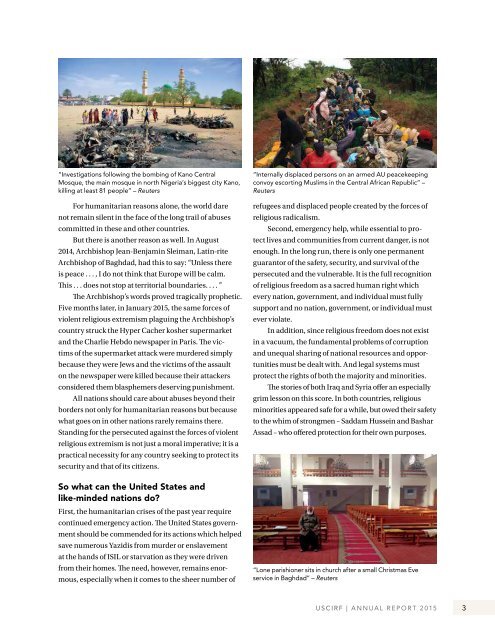USCIRF Annual Report 2015 (2)
USCIRF Annual Report 2015 (2)
USCIRF Annual Report 2015 (2)
You also want an ePaper? Increase the reach of your titles
YUMPU automatically turns print PDFs into web optimized ePapers that Google loves.
“Investigations following the bombing of Kano Central<br />
Mosque, the main mosque in north Nigeria’s biggest city Kano,<br />
killing at least 81 people” – Reuters<br />
For humanitarian reasons alone, the world dare<br />
not remain silent in the face of the long trail of abuses<br />
committed in these and other countries.<br />
But there is another reason as well. In August<br />
2014, Archbishop Jean-Benjamin Sleiman, Latin-rite<br />
Archbishop of Baghdad, had this to say: “Unless there<br />
is peace . . . , I do not think that Europe will be calm.<br />
This . . . does not stop at territorial boundaries. . . . ”<br />
The Archbishop’s words proved tragically prophetic.<br />
Five months later, in January <strong>2015</strong>, the same forces of<br />
violent religious extremism plaguing the Archbishop’s<br />
country struck the Hyper Cacher kosher supermarket<br />
and the Charlie Hebdo newspaper in Paris. The victims<br />
of the supermarket attack were murdered simply<br />
because they were Jews and the victims of the assault<br />
on the newspaper were killed because their attackers<br />
considered them blasphemers deserving punishment.<br />
All nations should care about abuses beyond their<br />
borders not only for humanitarian reasons but because<br />
what goes on in other nations rarely remains there.<br />
Standing for the persecuted against the forces of violent<br />
religious extremism is not just a moral imperative; it is a<br />
practical necessity for any country seeking to protect its<br />
security and that of its citizens.<br />
So what can the United States and<br />
like-minded nations do?<br />
First, the humanitarian crises of the past year require<br />
continued emergency action. The United States government<br />
should be commended for its actions which helped<br />
save numerous Yazidis from murder or enslavement<br />
at the hands of ISIL or starvation as they were driven<br />
from their homes. The need, however, remains enormous,<br />
especially when it comes to the sheer number of<br />
“Internally displaced persons on an armed AU peacekeeping<br />
convoy escorting Muslims in the Central African Republic” –<br />
Reuters<br />
refugees and displaced people created by the forces of<br />
religious radicalism.<br />
Second, emergency help, while essential to protect<br />
lives and communities from current danger, is not<br />
enough. In the long run, there is only one permanent<br />
guarantor of the safety, security, and survival of the<br />
persecuted and the vulnerable. It is the full recognition<br />
of religious freedom as a sacred human right which<br />
every nation, government, and individual must fully<br />
support and no nation, government, or individual must<br />
ever violate.<br />
In addition, since religious freedom does not exist<br />
in a vacuum, the fundamental problems of corruption<br />
and unequal sharing of national resources and opportunities<br />
must be dealt with. And legal systems must<br />
protect the rights of both the majority and minorities.<br />
The stories of both Iraq and Syria offer an especially<br />
grim lesson on this score. In both countries, religious<br />
minorities appeared safe for a while, but owed their safety<br />
to the whim of strongmen – Saddam Hussein and Bashar<br />
Assad – who offered protection for their own purposes.<br />
“Lone parishioner sits in church after a small Christmas Eve<br />
service in Baghdad” – Reuters<br />
<strong>USCIRF</strong> | ANNUAL REPORT <strong>2015</strong> 3


